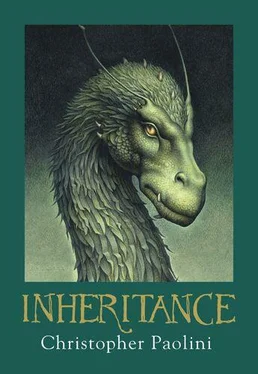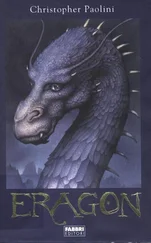The six men positioned themselves in front of the horses, facing the trampled wall of ferns, and drew their weapons. Outside the hollow, the hunting cries of the hounds sounded louder than ever, their overeager yelps echoing off the trees in a raucous din.
Roran tensed and lifted his hammer higher. Then, interspersed with the barking of the dogs, he heard the strange, lilting melody of the ancient language emanating from Carn, and the power contained within the phrases caused the back of Roran’s neck to prickle with alarm. The spellcaster uttered several lines in a short, breathless manner, speaking so quickly, the words melded together into an indistinct babble. As soon as he finished, he gestured at Roran and the others and said in a strained whisper, “Get down!”
Without question, Roran dropped to his haunches. Not for the first time, he cursed the fact that he was unable to use magic himself. Of all the skills a warrior could possess, none was more useful; lacking it left him at the mercy of those who could reshape the world with nothing more than their will and a word.
The ferns in front of him rustled and shook; then a hound pushed its black-tipped snout through the foliage and peered at the hollow, nose twitching. Delwin hissed and raised his sword, as if to behead the dog, but Carn made an urgent noise in his throat and waved at him until he lowered his blade.
The dog furrowed its brow, appearing puzzled. It scented the air again, then licked its jowls with its engorged, purplish tongue, and withdrew.
As the fronds sprang back over the dog’s face, Roran slowly released the breath he had been holding. He looked at Carn and raised an eyebrow, hoping for an explanation, but Carn just shook his head and placed a finger over his lips.
A few seconds later, two more dogs wiggled their way through the undergrowth to inspect the hollow; then, like the first one, they backed out after a short while. Soon the pack began to whine and yip as they cast about among the trees, trying to figure out where their prey had gone.
As he sat waiting, Roran noticed that his leggings were mottled with several dark blotches along the inside of his thighs. He touched one of the discolored areas, and his fingers came away with a film of bloody liquid. Each blotch marked the location of a blister. Nor were they his only ones; he could feel blisters on his hands-where the reins had chafed the web of skin between his thumbs and forefingers-and on his heels, and in other, more uncomfortable places.
With an expression of distaste, he wiped his fingers against the ground. He looked at his men, at how they crouched and knelt, and he saw the discomfort on their faces whenever they moved and the slightly twisted grips with which they held their weapons. They were in no better condition than he was.
Roran decided that when they next stopped to sleep he would have Carn heal their sores. If the magician seemed too tired, however, Roran would refrain from having his own blisters healed; he would rather endure the pain than allow Carn to expend all of his strength before they arrived at Aroughs, for Roran suspected that Carn’s skills might very well prove useful in capturing the city.
Thinking of Aroughs and of the siege he was somehow supposed to win caused Roran to press his free hand against his breast to check that the packet containing the orders he could not read and the commission he doubted he would be able to keep were still safely tucked in his tunic. They were.
After several long, tense minutes, one of the hounds began to bark excitedly somewhere in the trees upstream. The other dogs rushed in that direction and resumed the deep-chested baying that meant they were in close pursuit of their quarry.
When the clamor had receded, Roran slowly rose to his full height and swept his gaze over the trees and bushes. “All clear,” he said, keeping his voice subdued.
As the others stood, Hamund-who was tall and shaggy-haired and had deep lines next to his mouth, although he was only a year older than Roran-turned on Carn, scowling, and said, “Why couldn’t you have done that before, instead of letting us go riding willy-nilly over the countryside and almost breaking our necks coming down that hill?” He motioned back toward the stream.
Carn responded with an equally angry tone: “Because I hadn’t thought of it yet, that’s why. Given that I just saved you the inconvenience of having a host of small holes poked in your hide, I would think you might show a bit of gratitude.”
“Is that so? Well, I think that you ought to spend more time working on your spells before we’re chased halfway to who-knows-where and-”
Fearing that their argument could turn dangerous, Roran stepped between them. “Enough,” he said. Then he asked Carn, “Will your spell hide us from the guards?”
Carn shook his head. “Men are harder to fool than dogs.” He cast a disparaging look at Hamund. “Most of them, at least. I can hide us, but I can’t hide our trail.” And he indicated the crushed and broken ferns, as well as the hoofprints gouged into the damp soil. “They’ll know we’re here. If we leave before they catch sight of us, the dogs will draw them off and we’ll-”
“Mount up!” Roran ordered.
With an assortment of half-muttered curses and poorly concealed groans, the men climbed back onto their steeds. Roran glanced over the hollow one last time to make sure that they had not forgotten anything, then guided his charger to the head of the group and tapped the horse with his spurs.
And together they galloped out from under the shadow of the trees and away from the ravine as they resumed their seemingly never-ending journey to Aroughs. What he would do once they reached the city, though, Roran had not the slightest idea.
Eragon rolled his shoulders as he walked through the Varden’s camp, trying to work out the kink in his neck that he had acquired while sparring with Arya and Blodhgarm earlier that afternoon.
As he topped a small hill, which stood like a lone island amid the sea of tents, he rested his hands on his hips and paused to take in the view. Before him lay the dark spread of Leona Lake, gleaming in the twilight as the crests of the shallow waves reflected the orange torchlight from the camp. The road the Varden had been following lay between the tents and the shore: a broad strip of paving stones set with mortar that had been constructed, or so Jeod had informed him, long before Galbatorix had overthrown the Riders. A quarter mile to the north, a small, squat fishing village sat close against the water; Eragon knew its inhabitants were far from happy that an army was camped on their doorstep.
You must learn … to see what you are looking at .
Since leaving Belatona, Eragon had spent hours pondering Glaedr’s advice. He was not certain exactly what the dragon had meant by it, as Glaedr had refused to say anything more after delivering his enigmatic statement, so Eragon had chosen to interpret his instruction literally. He had striven to truly see everything before him, no matter how small or apparently insignificant, and to understand the meaning of that which he beheld.
Try though he might, he felt as if he failed miserably. Wherever he looked, he saw an overwhelming amount of detail, but he was convinced there was even more that he was not perceptive enough to notice. Worse, he was rarely able to make sense of what he was aware of, like why there was no smoke rising from three of the chimneys in the fishing village.
Despite his sense of futility, the effort had proved helpful in at least one regard: Arya no longer defeated him every time they crossed blades. He had watched her with redoubled attention-studying her as closely as a deer he was stalking-and as a result, he had won a few of their matches. However, he still was not her equal, much less her better. And he did not know what he needed to learn-nor who could teach him-in order to become as skilled with a blade as she was.
Читать дальше





![Christopher Paolini - Brisingr [en]](/books/195528/christopher-paolini-brisingr-en-thumb.webp)
![Christopher Paolini - Eldest [en]](/books/223279/christopher-paolini-eldest-en-thumb.webp)
![Christopher Paolini - Eragon [en]](/books/248440/christopher-paolini-eragon-en-thumb.webp)




